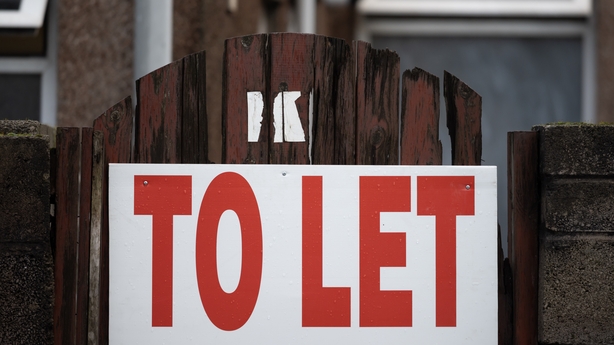When the property website daft.ie published its latest report on the rental market earlier this month, it noted double digit increases in rents being sought in parts of the country.
It was mainly down to what was referred to as a 'chronic under-supply' of properties with fewer than 2,500 rental homes available nationally on August 1st.
That was the lowest number since records began in 2006.
In County Offaly, there were just eight houses available to rent and 15 in County Waterford.
However, in Dublin rents were relatively stable, increasing by a very marginal 0.5% on an annual basis with rents being sought in some parts of the city 7% below where they were at the same time last year.
The capital accounted for the bulk of the properties on the market with 1,666 homes to rent.
It was marginally higher than the figure on the same date two years earlier, months before the Covid-19 pandemic struck.
So, if supply is becoming so tight in the rest of the country, why has it been relatively stable in Dublin and why are rents increasing at a slower pace there?
Part of it may be accounted for by people joining the anecdotal 'pandemic exodus' from the capital and setting up home in the country.
There was also a stemming of the flow of people into Dublin from overseas with the introduction of travel restrictions, with many who were already here opting to return to their home countries for the duration of the restrictions.
But there's another factor to consider and that's the short-term letting market with the likes of Airbnb and other websites accused of 'sucking' supply from the long-term rental market, much of which came back on stream during the pandemic.
How much of a problem has the short-term letting market been?
There are conflicting views as to how much of an impact short-term letting have had on the overall rental market.
The pandemic appears to have at least partially laid bare the extent of the 'Airbnb effect'.
Returning to the figures from daft.ie, on August 1st, 2019, there were 1,600 properties on the long-term rental market in the capital.
On the same day the following year, that had almost doubled to 3,000 before reaching a pandemic high of 3,322 on December 1st, 2020.

In contrast, the number of properties available for short-term letting on the Airbnb website pre-pandemic stood at about 5,000 in Dublin.
In recent days, according to a website that tracks short-term rentals on Airbnb and Vrbo, just over 2,600 properties were available in Dublin of which just under 1,500 were entire homes.
So, the pandemic has clearly had an impact, but what happens now that tourism is getting back up and running and those landlords who may have put their property onto the long-term market for maybe a year's lease are now contemplating a return to the lucrative short-term market?
"It could put a further pinch point on stock," Marian Finnegan of Managing Director of estate agents Sherry Fitzgerald said.
"If that surge was to be reversed, we could be back down to near 1,000 units for Dublin," she said.
Indeed, there are indications that the shift back to the short-term market could already be in motion.
According to daft.ie, the number of properties available to rent in Dublin had fallen from over 1,600 at the start of the month to around 1,350 in recent days.
Clampdown
Prior to the pandemic, attempts had been made at regulating the short-term letting market.
In Rent Pressure Zones (where rental increases are capped at 4% a year), landlords were required from 2019 to obtain planning permission if they were seeking to put their properties on the short-term letting market for more than 90 days a year with City and County Councils tasked with policing the restrictions.
Oversight of those regulations is likely to switch to the Residential Tenancies Board (RTB) under the Government's 'Housing For All' plan, the details of which are expected to be published in the coming days.
The Minister for Housing, Daragh O'Brien told the Business Post last week that under the new scheme, property owners would not be permitted to advertise a short-term let unless they had received "the requisite planning permission" to do so.
He told the paper that he would be seeking to introduce a licensing regime similar to the one in operation in Lisbon.
The Minister said the system introduced in the Portuguese capital had ensured that properties were let out for 'appropriate periods of time', which appears to indicate that a threshold of a certain number of days may remain in place to allow people to rent out their homes as a means of financing their own holidays, for example.
In response to the reports of the new regulations, Airbnb said it welcomed the opportunity to liaise with the Government on the way ahead regarding home sharing rules here.
"While we have not seen any specific proposals, we remain committed to collaborating with leaders on measures that work for everyone and help local families share their homes and follow the rules," a company spokesperson said.
"We have signed more than 1,000 regulatory and tax agreements globally and we look forward to continuing our positive talks with the Irish government."

Would greater regulation provide a solution to the rental supply problem?
If new regulations served to drive the 1,500 full properties available on the short-term letting platforms back into the long-term market in Dublin alone, it certainly would help, but it's unlikely to provide a comprehensive solution.
As Marian Finnegan points out, the flow of stock onto the long-term market during the pandemic restrictions provided a temporary respite to what she called 'the quandary of inadequate available stock' in the rental market.
"It is not a long-term solution. The biggest challenge here is the exodus of private investors from the market," she said.
"For much of the past decade, the flow of new investors into the rental market has been dwindling and this is having a detrimental impact on the national supply of rental properties," she explained.
Citing statistics from the Central Bank and the Banking and Payments Federation, she pointed out that in the last decade, the volume of outstanding buy-to-let mortgages had fallen from 150,000 to below 95,000 - a decline of over a third.
That compares to a 5% fall in the same period in the volume of outstanding mortgages for which the property was the person's principal dwelling.
Research carried out by Sherry Fitzgerald found that just under a third of vendors selling property this year were investors selling a buy-to-let property whereas just 14% of purchasers were investors buying a property.
"This all indicates that in recent years, there were very few new BTL (buy-to-let) entrants into the mortgage market, particularly compared to first-time buyers or owner-occupiers, resulting in little additional rental supply," Marian Finnegan concluded.
The need for additional housing supply of all categories is a point that Trinity College Economics Professor Ronan Lyons, author of the reports for daft.ie, agrees on.
He described the pandemic as having taken a problem that was largely confined to the urban rental market and spreading it across the country.
"Over the past 10 or 15 years, we haven't seen any new rental accommodation built at any scale," he told Morning Ireland in recent weeks.
"This is a particularly sharp point in the rental crisis as it moves to many new markets. It's a problem that can only be solved by adding additional rental accommodation," he said.
While the regulation of short-term letting platforms might provide a temporary and partial reprieve, it's far from the silver bullet that's needed to conquer a supply shortfall that's rapidly deteriorating in every part of the country.







